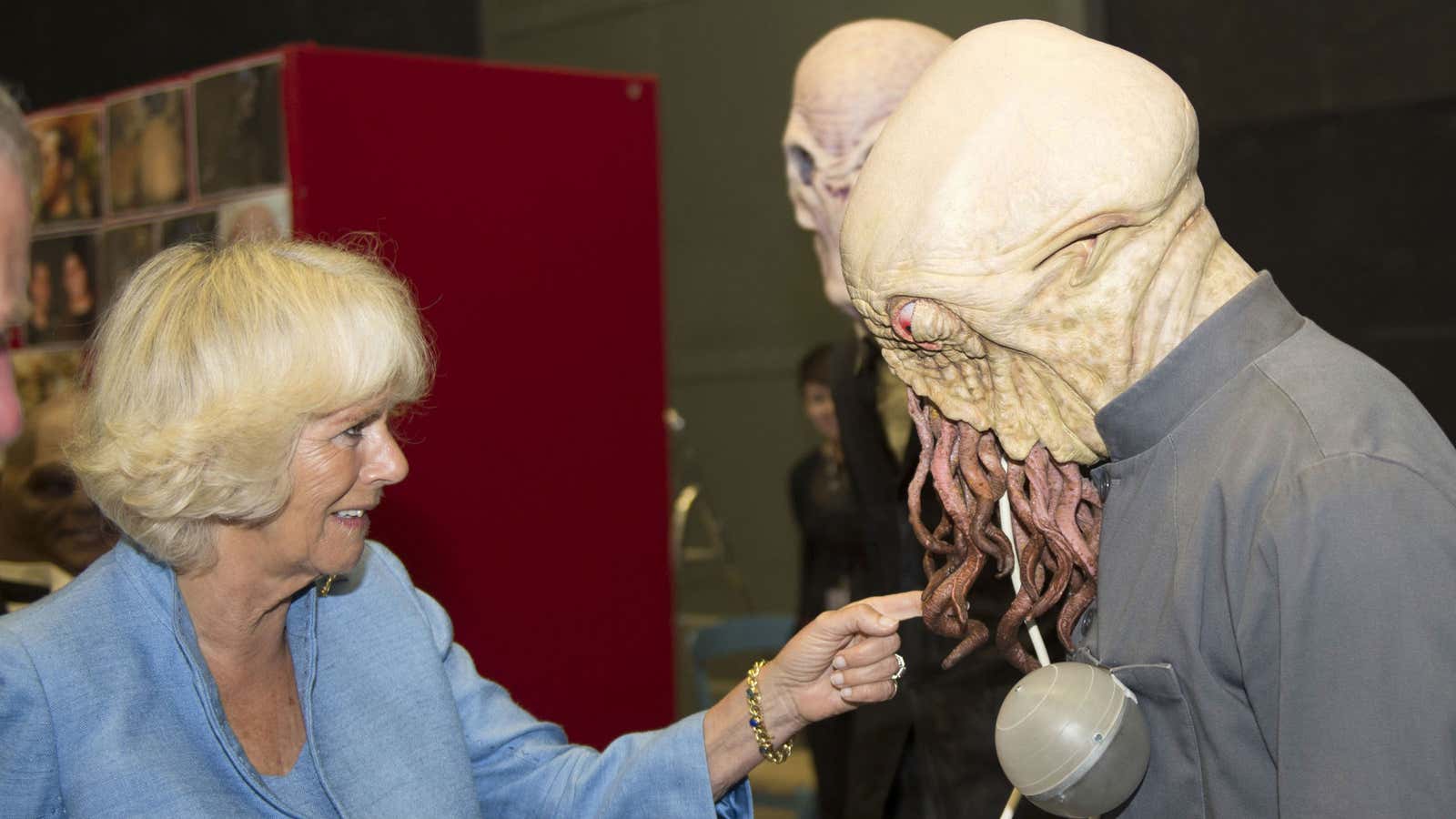Although awards shows are all about the excitement of the moment–that’s why they’re live–this year’s Bafta television crop is more about continuity than revolution. There was mild controversy because ITV outperformed BBC, winning 3 awards for the drama serial Broadchurch. Like Channel 4’s Southcliff, Broadchurch used a conventional murder investigation form to delve deeply into character and the making and breaking of a small-town community.
But it wasn’t especially radical. Looking at the awards more generally, the nominees all perpetuate a specifically British heritage. There are the short-form or one-off television dramas, the writer-led comedies that rework the traditional sitcom, and entertainment that showcases our national expertise in devising factual formats. While excellent imports like Nordic noir may rise and fall, British TV continues to excel in these categories.
Britain leads the world in devising hybrids of documentary, competition and light entertainment. Pop Idol followed aspirant amateur singers, cooks compete in MasterChef, and celebrities learn a new discipline in Strictly Come Dancing.The Great British Bake-off was nominated in both the Features category and the Radio Times Audience Award. It has been running since 2010 and won a Bafta last year. It was beaten this time by Long Lost Family, but for me Bake-off is the best recent docu-gameshow-entertainment hybrid.
Each episode follows the minor challenges posed by making pre-rehearsed dishes, without hysteria. What matters is “an even bake” rather than a prize. Shot in the kind of marquee used for village fetes, and set in the grounds of a historic house, the Bake-off is nostalgic in that it wants us to admire craft and skill, rather than cunning.
To be sure, it is middle-class and middle-brow, but as Sarah Cardwell has shown, its brilliance is in its tone. Knowing self-deprecation embodied by presenters Mel Giedroyc and Sue Perkins combines with pride in expertise and draws on a heritage of cooking shows personified by resident expert Mary Berry.
Berry was cookery editor for Housewife magazine in the 1960s and her career as a TV cook started on ITV’s Afternoon Plus a few years later. The Bake-off’s ingredients produce a glow of satisfaction that is made for sharing. It reminds us that television, unlike browsing YouTube on your laptop, works best as a collective pleasure.
We can say something similar about an ostensibly very different show: the sitcom The IT Crowd, which took home 2 prizes, leading after Broadchurch. Its writer Graham Linehan refused to follow the trend in the last decade for “opened out” location-shot comedy. Instead, he set the show almost wholly in the basement office of its 3 main characters.
This method of “theatrical” shooting in a 3-walled set, open on one side to a live studio audience, is also used in the hit sitcom Miranda and harks back to the “golden age” of 1960s British sitcom. Narratives are driven by dialogue and not physical action, characters are spatially constrained and emotionally trapped. Viewers are invited to join in with the studio audience laughing on the as-live soundtrack. The nerdy protagonists Moss (Richard Ayoade) and Roy (Chris O’Dowd), with their useless boss the “Relationship Manager” Jen (Katherine Parkinson) might be recognizable as stereotyped Microserfs from almost anywhere. But making comedy out of the bleak nihilism and dogged persistence they display is very specific to British sitcom’s heritage of interest in failure and embarrassment.
Samuel Beckett’s 1958 novel The Unnameable ends: “You must go on, I can’t go on, I’ll go on.” It is this sentiment which is peculiarly British. Dad’s Army’s protagonists, and Harold in Steptoe and Son used this in front of their live audiences 45 years ago. Both German and US adaptations of The IT Crowd have failed, but this year Ayoade and Parkinson won the Baftas for Male Performance and Female Performance in a Comedy respectively.
But the biggest strength of British television is probably in drama. We more or less invented television drama, initially restaging theatre for the cameras and then developing new, original forms like the social-realist Cathy Come Home in 1966 and the experimental Modernism of Pennies from Heaven in 1978.
Doctor Who was a triumph of that Golden Age. Its beginnings in 1963 were dramatized last year in An Adventure in Space and Time, a nominee for the Radio Times Audience Award. The award in the end went to the Doctor Who 50th anniversary special The Day of the Doctor, whose storyline careered back and forth across the Doctor’s centuries-long existence. This was not only a showcase of Doctor Who, but also of the BBC’s international brand. The Day of the Doctor was the world’s largest ever simulcast of a TV drama: it was screened at the same time on TV or in cinemas in 94 countries.
These strengths are all summed up by the Bafta Special Award, which went to Cilla Black, who first appeared on TV in 1968 in her own star vehicle, Cilla. Here we have a reminder that the 60s were not just a time when Britain had the best pop music, best fashion and (briefly) the best football team in the world, but also the best television. And the 2014 Baftas remind us that the legacy of that period still drives and shapes the creative values and shared pleasures of today.
This post originally appeared at The Conversation. Follow @ConversationUK on Twitter.




